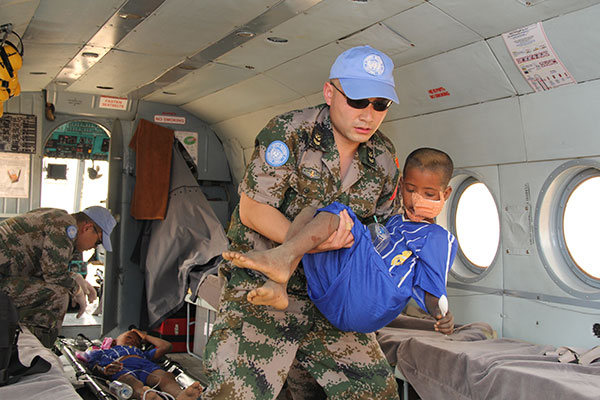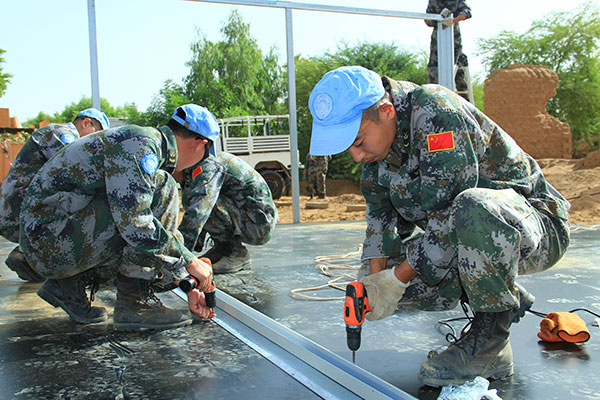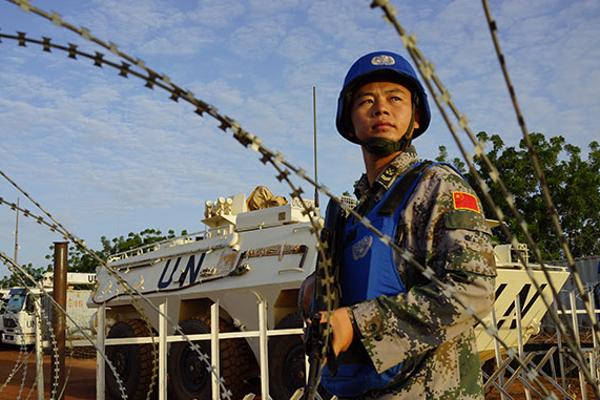
A Chinese peacekeeper takes a wounded boy to a helicopter to go to another city to receive treatment.[Photo/Provided to China Daily]
After eight months, the first troops of the People’s Liberation Army taking part in the United Nations Multidimensional Integrated Stabilization Mission in Mali returned to China in September.
At the request of the UN, the PLA had deployed the troops made up of 155 engineers, 70 medical workers and 170 soldiers to the West African country.
During the period, the troops successfully repaired roads and bridges, safeguarded peace and stability, and provided medical assistance.
On Aug 1, 2014, the 87th anniversary of the PLA, all 395 Chinese peacekeepers were awarded the UN Peace Medal for their outstanding contributions in the mission.
This is China’s 30th UN peacekeeping mission since 1990.
So far, more than 27,000 Chinese military personnel have participated in UN peacekeeping missions in 24 mission areas, making China the biggest contributor to such missions among the five permanent members of the UN Security Council.
The latest mission marked the first time China had sent security forces on such a deployment, and it was a big step for the country in UN peacekeeping efforts.
The participating Chinese Force Protection Company, all from a Harbin-based contingent, was set up in July 2013.
“In just two days after announcing the news of forming the first such peacekeeping security forces, more than 2,000 soldiers submitted their applications for the mission,” said Zhang Geqiang, head of the contingent.
Yang Huawen, a 28-year-old captain who has served in the army for 10 years, was preparing for his wedding at that time.
“When I got the news, my first thought was ‘I must participate in the mission’. That also meant I would have to postpone my wedding to the next year,” Yang said.
To allow Yang to carry out the mission wholeheartedly, his wife decided to register their marriage before his departure.
“She is a policewoman and she continually supports me,” Yang said. “We registered our marriage on the morning of July 1 last year, and my orders to depart to Mali came that afternoon.”
“I asked her not to worry about me because I was part of a strong team and I could carry out the mission in Mali successfully,” Yang said.
“But I was actually aware of the dangers involved. Before departing for the mission, I had already prepared documents in case I did not survive.”
After returning in triumph, the most important thing for Yang was to give his wife the best wedding ceremony he could.
“We held the ceremony on Oct 1, China’s National Day,” Yang said.

The Chinese Engineer Company builds the headquarters in Sector East of the Mali mission.[Photo by Gai Xuhui/China Daily]
During the eight months, the Chinese Force Protection Company successfully guarded the mission headquarters and the living quarters of peacekeeping forces.
“Before departing, I led a series of special training programs for the team to enhance their physical and psychological capabilities. We all got ready for the challenges, from the extreme natural environment and the grim situation of Mali,” Zhang said.
“But when we landed in Gao, the city in east Mali where Sector East of the mission was located, we were overwhelmed by a series of difficulties beyond our imagination.”
Mali, with a tropical desert climate, is extremely dry and hot.
Although the troops had been trained for the local weather, the huge temperature differences between Harbin and Gao were still very challenging. Up to one-fifth of the contingent had been hit by fever.
“Almost every one of us had been bitten by various mosquitoes and other insects that we never saw in China,” Zhang said.
“The sudden sandstorms could also sweep whole tents away.
“But all these difficulties could not dampen the spirit of the Chinese Blue Helmets. From the first day we set foot in Mali, we knew we had to stick to our posts.”
The troops continued to face life and death situations on a daily basis.
The situation in Mali is very unstable, with extremists rampant in the region, and the mission camp was attacked continually.
The well-trained Chinese peacekeepers built a strong defense against these threats with their sophisticated Chinese-designed and manufactured military equipment.
“The Chinese peacekeepers are the best I have met and you are trustworthy,” said Herve Ladsous, the UN under-secretary-general for peacekeeping operations, during his trip to inspect the troops in China in October 2013.
In the camps of the Multidimensional Integrated Stabilization Mission in Mali, there is a famous Chinese Blue Helmets Honor Guard.
The honor guard is composed of 26 members selected from the contingent, and it is the first peacekeeping honor guard of China.
“We must complete our tasks on the basis of ensuring the safety of important people under such dangerous situations,” said Wang Yang, the head of the team.
“We train only during our spare time because of the demands from our daily tasks,” Wang said.
“But everybody trained hard because we know that we represent China and the PLA.”
Since its establishment in February, the team has completed 23 of its tasks and won the appreciation of the world’s most important politicians and generals.
“We are guilty of being unfilial sons or absent fathers or husbands, but we all play one role successfully-that of a Chinese soldier,” Zhang Geqiang said.

A Chinese peacekeeper guards the mission camp in Mali in September. This was the first time the PLA took part in the UN mission in Mali.[Photo/Provided to China Daily]
HEALING HANDS
In the UN peacekeeping mission in Mali, the People’s Liberation Army deployed a medical contingent including 70 members, of whom 12 were women.
At the request of the United Nations, the medical contingent was tasked with building a Level-Two Hospital to provide medical security for more than 3,000 UN peacekeeping members in Gao.
As another such hospital in Kidal, a city 400 kilometers from Gao, was not established, the Chinese medical contingent actually served 4,700 peacekeeping officials and soldiers in both Gao and Kidal.
“When we arrived at Gao, we only found a big open ground full of rubbish and sand,” recalled Jiang Ying, a dermatologist.
“We cleared the rubbish and board rooms all by ourselves. In the first month, all of us had to live in tents where the temperature would rise to 50 C at noon. And because the water supply system hadn’t been completed, all of us couldn’t take a shower for a month.”
After four and a half months of hard work, the hospital was completed ahead of schedule and put into use on April 25.
In the five months after its opening, the hospital received more than 800 patients and performed 2,100 examinations and 33 operations.
This was the third time for Xiao Gang, the head of the medical contingent, to take part in a peacekeeping mission.
“The experience of peacekeeping missions in Congo and Lebanon helped me a lot,” Xiao said. “We had made enough preparations, from medical equipment to emergency plans.”
When Mamadou Sambe, the commander of Sector East of the mission, visited the wounded soldiers in the hospital, he praised “the strict work style, the meticulous service and the strong medical treatment ability” of the medical contingent and called it “a magical medical team”.
ENGINEERS PERSEVERE AND IMPRESS
As the sole engineer company during the eight months in Sector East of the United Nations Multidimensional Integrated Stabilization Mission in Mali, the Chinese Engineer Company’s 155 members completed more than 100 tasks, including building the mission camps, living quarters and Gao airport building.
The contingent faced the dual challenge of difficult engineer tasks and terrorist attacks.
“Unlike the other two Chinese teams, we had to leave our camps to complete some of the tasks. Sometimes, we would be in areas controlled by anti-government armed forces,” said Zhang Wen-yong, the commissar of the engineer contingent.
“We had to ensure our own safety and complete the tasks.”
The engineer contingent carried out all its duties successfully and won high praise from the mission officials.
“The Chinese Engineer Company is a model for all the peacekeeping forces. It finished the most tasks with the best quality. And it is an effective work team with strict discipline,” said General Jean Bosco Kazura, force commander of the UN mission.
“It made the greatest contribution” to the mission, he said.
